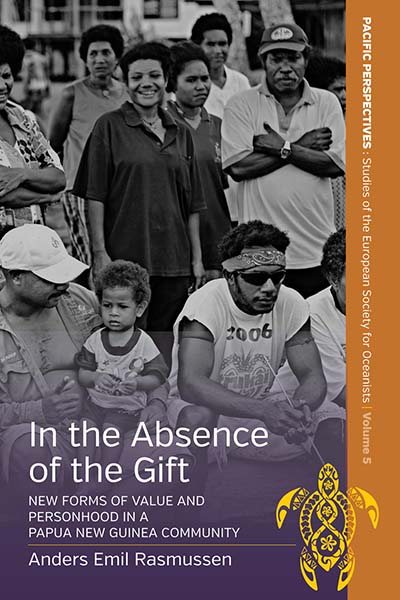
Series
Volume 5
Pacific Perspectives: Studies of the European Society for Oceanists
See Related
Anthropology JournalsEmail Newsletters
Sign up for our email newsletters to get customized updates on new Berghahn publications.
In the Absence of the Gift
New Forms of Value and Personhood in a Papua New Guinea Community
Anders Emil Rasmussen
210 pages, 3 illus., bibliog., index
ISBN 978-1-78238-781-7 $135.00/£104.00 / Hb / Published (September 2015)
ISBN 978-1-78920-806-1 $34.95/£27.95 / Pb / Published (September 2020)
eISBN 978-1-78238-782-4 eBook
Reviews
“Rasmussen’s book is a valuable contribution to the burgeoning literature on personhood, sociality, and transaction in contemporary Papua New Guinea as this postcolonial nation experiences monetization, urbanization, migration, and mounting economic inequalities.” · Pacific Affairs
“In the Absence of the Gift masterfully integrates a number of issues and practices—remittances, marketing and debt, community development projects, and collective activities like canoe-building—that might at first glance appear unrelated. Rasmussen embraces them all under the rubric of 'seeing' and making relations, and he illustrates how new social concepts like 'debt' or 'community' continue to operate within traditional understandings of obligation, generosity, and selfishness. At the same time, he highlights new possibilities of individual personhood and of collective identity that are currently under construction, the outcomes of which are given neither by 'traditional' culture nor by 'modern' global culture.” · Anthropology Review Database
“… a very convincing case for the refiguring of our understanding of contemporary remittance motivations. Crucial to this is the focus on sharing, as opposed to formal transaction . . . Also original and exciting is the emphasis on the deployment of ‘community’ as a crucial indigenous category of description and organization . . . I have not read a better or more convincing account of the category in Melanesia.” · Adam Reed, University of St. Andrews
“[This book] significantly advances arguments in the discipline in a number of key areas, such as the relationship between community and individualism, the role of money, and the nature of obligation in exchange. It marks a significant contribution to our ethnographic understanding of the relationship between gifts and community building.” · Keir Martin, University of Manchester
Description
By adopting ideas like “development,” members of a Papua New Guinean community find themselves continuously negotiating what can be expected of a relative or a community member. Nearly half the people born on the remote Mbuke Islands become teachers, businessmen, or bureaucrats in urban centers, while those who stay at home ask migrant relatives “What about me?” This detailed ethnography sheds light on remittance motivations and documents how terms like “community” can be useful in places otherwise permeated by kinship. As the state withdraws, Mbuke people explore what social ends might be reached through involvement with the cash economy.
Anders Emil Rasmussen is curator of ethnographic exhibitions at Moesgaard Museum, Denmark. His publications include Materialities of Passing (co-ed., Ashgate, 2016).

